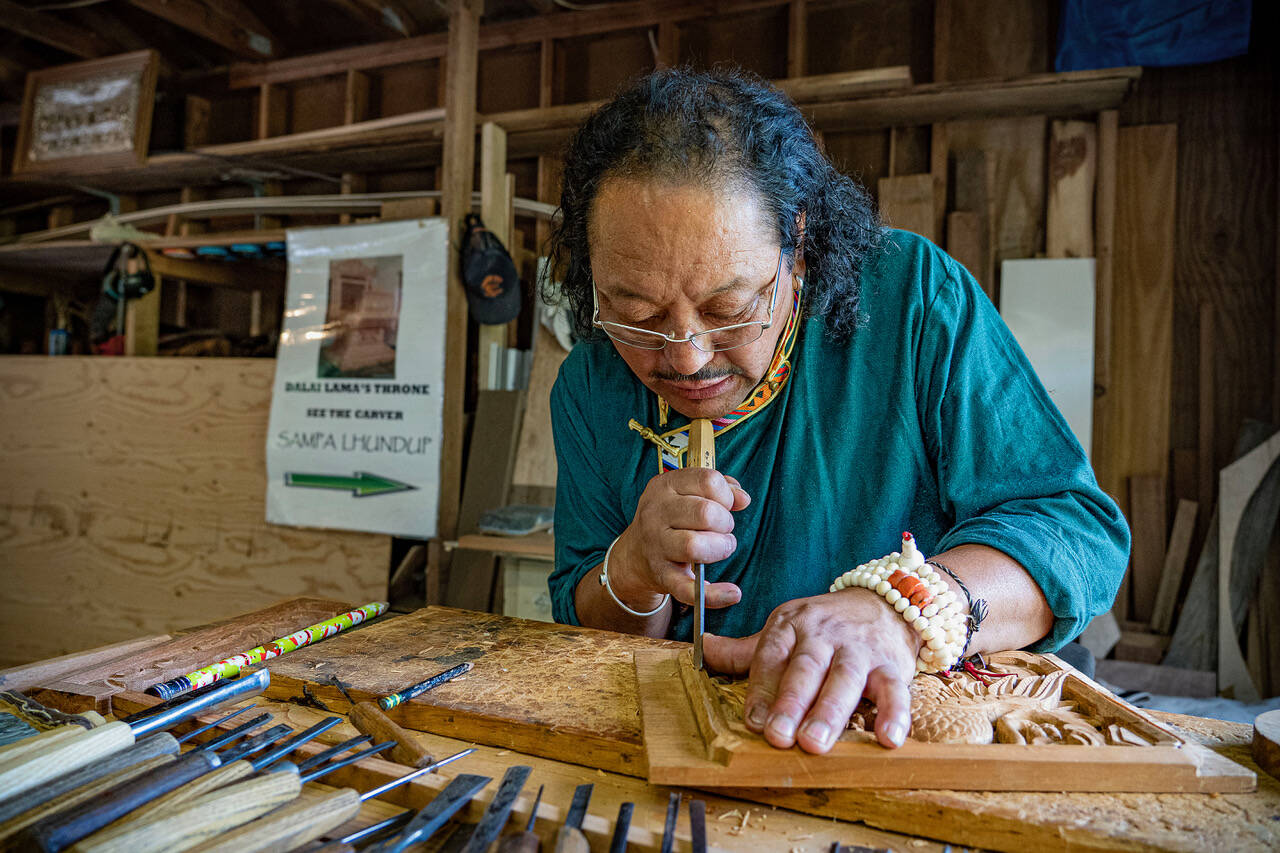In a world becoming increasingly reliant on the use of modern technology to create art, a South Whidbey resident is taking things back several hundred years with the ancient tradition of Tibetan woodcarving.
Sampa Lhundup’s workshop is adorned with his intricate carvings, most of which are decorations that people hang in their homes. Ornate and symbolic, some are brushed with gold paint, while others let the natural mahogany shine.
“No photocopy, no any other piece in the world,” he said. “Just my mind.”
Lhundup stops to point out the Eight Auspicious Signs of Buddhism, beaming as he drapes the visitors to his studio with a khata, a Tibetan Buddhism ceremonial scarf bearing the symbols for good luck and welcome. A photo album documents his time living in India carving for the Dalai Lama, and a sign in the workshop depicting the spiritual leader’s throne proudly proclaims Lhundup as the carver.
“I made the room, the bed, shrine,” he said. “I built his holiness, the Dalai Lama, his teaching throne.”
With his cheerful demeanor and positive outlook, one might never guess that Lhundup faced such hardship earlier in his life. Born in Tibet, he was part of the region’s freedom movement and had to flee his homeland, which was taken over by China. He escaped through the Himalayas, making the treacherous 28-day journey on foot.
“We walk all the night,” he recalled. “Daytime, we can’t do. Chinese, they are watching. They shoot the people. They kill us.”
This was around the time Lhundup started learning how to carve from his father, who learned the craft from Lhundup’s grandfather. In fact, some of the tools he still uses today were his grandfather’s and are over 100 years old. He has heard from other relatives that his great-grandfather was also a carver, making Lhundup a fourth-generation carver.
He lived in India for 17 years, where the Dalai Lama and the Tibetan government in exile are both located, before coming to the U.S. He completed his Tibetan carvings for various Buddhist temples, including the Phagtsok Gedun Choling Temple in Clinton, which opened its 11-foot-tall doors in 2019.
Cary Peterson, a student of Dza Kilung Rinpoche – head of Kilung Monastery in the Dzachuka region of Kham, Tibet and founder of the Kilung Foundation in Clinton – noted that it takes years of training to be able to execute the designs and symbols with the beauty and skill that Lhundup does.
“He’s an incredibly gifted, skilled, traditional Tibetan carver,” Peterson said. “We’re really blessed.”
Lhundup moved to Clinton a few years ago. His wife, Gadon Thilly, is a U.S. citizen also born in Tibet who works most of the year as a sushi chef on Capitol Hill in Washington, D.C., serving her food to the senators and representatives of Congress.
“He can make anything that people want,” Thilly said proudly of her husband. “Wood carving, stone carving. Any kind of design, he can make it. Not only Tibetan.”
Indeed, one of Lhundup’s most difficult requests came from a man in Florida, who wanted a 3-D carving of two hands reaching out to touch each other. It was a departure from his usual work, which, while richly textured, is usually made to hang flat on a wall. Parents and pets have been some of the other custom orders.
Incredibly, it takes Lhundup only a few days to chisel away at the wood, revealing his carving. Lions, elephants, birds and even people make their way into his art. Besides Buddhist symbols, he has also created plenty of Christian crosses for people.
As Peterson pointed out, the human craft of carving is quickly being superseded by machines, which can be programmed to do the work.
“You lose something when you don’t have this human craft of doing it, and that’s where his gifts are really important,” she said.
Besides carving, Lhundup also makes furniture, like coffee tables, and is just as happy to take on handyman projects. He has built more than one meditation house for people, and has his own in his backyard.
A few weeks ago, a friend encouraged him to post on the Drewslist, the friendly South Whidbey version of Craigslist. Since then, he’s gotten several requests for work, and his schedule is filling up fast.
In addition, he has also taught his craft over two-day workshops, making Tibetan food for participants and immersing them in the culture of his homeland. He fondly remembers teaching more than 100 kids in India how to carve.
“Not much young people here,” he observed of South Whidbey. “It’s my age.”
To reach out to Lhundup about a project, email sampawoodman@gmail.com or call 585-766-0643.



